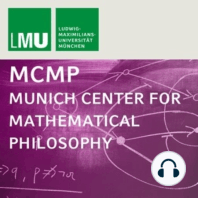92 min listen
An Aristotelian continuum
ratings:
Length:
47 minutes
Released:
Dec 31, 2014
Format:
Podcast episode
Description
Stewart Shapiro (Ohio) gives a talk at the MCMP Colloquium (18 December, 2014) titled "An Aristotelian continuum". Abstract: Geoffrey Hellman and I are working on a point-free account of the continuum. The current version is “gunky” in that it does not recognize points, as part of regions, but it does make essential use of actual infinity. The purpose of this paper is to produce a more Aristotelian theory, eschewing both the actual existence of points and infinite sets, pluralities, or properties. There are three parts to the talk. The first is to show how to modify the original gunky theory to avoid the use of (actual) infinity. It is interesting that there are a number of theorems in the original theory (such as the existence of bisections and differences, and the Archimedean property) that have to be added, as axioms. The second part of the talk is to take the “potential” nature of the usual operations seriously, by using a modal language. The idea is that each “world” is finite; the usual operations are understood as possibilities. This part builds on some recent work on set theory by Øystein Linnebo. The third part is an attempt to recapture points, but taking the notion of a potentially infinite sequence seriously.
Released:
Dec 31, 2014
Format:
Podcast episode
Titles in the series (22)
Remarks on the foundations of mathematics: Colloquium Mathematical Philosophy by MCMP – Philosophy of Mathematics
